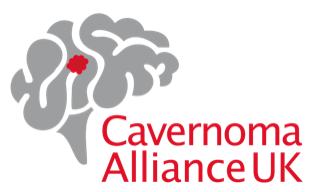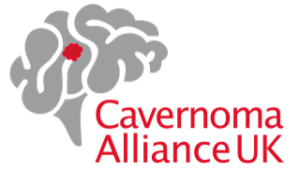Cavernomas: A Randomised Effectiveness (CARE) Study

In April 2024 the results of ‘Cavernomas: A Randomised Effectiveness (CARE) Study’ were published in The Lancet Neurology. This study was the first of its kind in the UK for cavernoma patients. It was led by the Chair of our Advisory Board, Professor Rustam Al-Shahi Salman, with the support of CAUK. This page tells you what we learnt from the study. Our heartfelt thanks go to everyone involved, in particular to Professor David White our retired Scientific Advisor.
Click here for the animation script. Please note, the script was updated after publication to clarify the barriers to people joining the study.
What was the question?
This project was the first step towards working out whether treatment of brain cavernoma with medical care and surgery (using either neurosurgery or stereotactic radiosurgery) reduces the risk of a stroke compared to medical care alone.
A cavernoma is a cluster of abnormal blood vessels that looks like a raspberry. Cavernomas can cause a variety of symptoms depending on their location. Some cavernomas cause a seizure or epilepsy. Cavernomas can also cause a stroke, mostly due to bleeding, with symptoms like weakness, numbness, or disturbed vision. Strokes and seizures can recur. About 180 people are diagnosed with symptomatic brain cavernoma in the UK each year.
Medical care for people with cavernoma involves things like anti-seizure drugs and physiotherapy.
Treatment with surgery can be done with neurosurgery to remove the cavernoma, or with stereotactic radiosurgery to stabilise it. The advantage of surgery is that further strokes or seizures may be prevented. But surgery has risks, which seem finely balanced with its benefits. So doctors and people with cavernoma often remain unsure about surgery.
What did the study do?
The most reliable study of whether surgery is best is a randomised trial. But this study would need to involve many people. So, this project was a pilot study for a bigger randomised trial.
Between August 2021 and January 2024, the pilot study team studied whether people with a brain cavernoma that had caused symptoms, and their doctors in the UK and Ireland would take part. A specialist team studied what influenced doctors’ and patients’ decisions.
The study team aimed to set up a network of specialists at 30 neurosurgery hospitals in the UK and Ireland. These specialists aimed to involve 60 people with a brain cavernoma that had caused symptoms in the pilot randomised trial over 18 months.
What did the study find?
30 hospitals in the UK and Ireland obtained ethics approval and 28 UK hospitals took part. Of 322 eligible people seen at these hospitals, 72 took part (68 adults and 4 children), and 67 were assessed 6 months later.
The biggest barrier to taking part was that patients tended to prefer medical care, avoiding surgery. Recruitment was better with specialists who were comfortable offering randomisation to people for whom medical care alone was usual practice, and with specialists who presented the study as a solution to uncertainty. During follow-up, two of 33 patients treated with surgery and medical care had a stroke and two of 34 patients who had medical care alone had a stroke. There were no deaths or serious adverse events.
What does this mean?
The pilot study team showed that a randomised trial of surgery for brain cavernoma is possible.
The pilot study recruited more people than planned and found what helped or stopped recruitment.
A bigger randomised trial of surgery will require extensive international engagement from funders, doctors, and patients.
Publications
- The Lancet Neurology Feasibility of comparing medical management and surgery (using neurosurgical resection or stereotactic radiosurgery) with medical management alone for people with symptomatic cerebral cavernous malformation (CARE): a randomised, open, parallel group, pragmatic, pilot phase trial.
- eClinicalMedicine Addressing barriers and identifying facilitators to support informed consent and recruitment in the Cavernous malformations A Randomised Effectiveness (CARE) pilot phase trial: insights from the integrated QuinteT Recruitment Intervention (QRI).
Further Information
We are pleased to share that Professor Rustam Al-Shahi Salman will be joining our Annual Forum at 11am on the 22nd of June to discuss the findings of the CARE pilot study in more detail. When registration opens at the end of April, you will be able to register by clicking here. More information is also available on the University of Edinburgh’s Clinical Trials Unit website www.ed.ac.uk/care-study.
The support Cavernoma Alliance UK provided
CAUK was the patient group co-applicant in the study and was involved in its development by providing the patient voice from the start. We co-developed the information leaflets for patients and also co-ordinated the Patient Advisory Group to oversee the conduct and progress of the CARE Study. Our sincere thanks go to the CAUK members who took part in both the PAG and the pilot study. Without their involvement this study wouldn’t have been possible.

